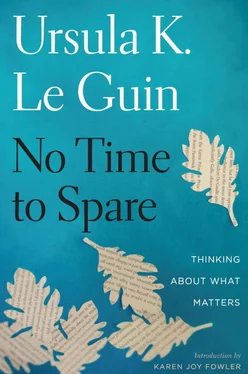Jealousy sticks its nasty yellow-green snout mostly into my life as a writer. I’m jealous of other writers who soar to success on wings of praise, I’m contemptuously angry at them, at the people who praise them—if I don’t like their writing. I’d like to kick Ernest Hemingway for faking and posturing when he had the talent to succeed without faking. I snarl at what I see as the unending overestimation of James Joyce. The enshrinement of Philip Roth infuriates me. But all this jealous anger happens only if I don’t like what they write. If I like a writer’s writing, praise of that writer makes me happy. I can read endless appreciations of Virginia Woolf. A good article about José Saramago makes my day. So evidently the cause of my anger isn’t so much jealousy or envy as, once again, fear. Fear that if Hemingway, Joyce, and Roth really are The Greatest, there’s no way I can ever be very good or very highly considered as a writer—because there’s no way I am ever going to write anything like what they write or please the readers and critics they please.
The circular silliness of this is self-evident; but my insecurity is incurable. Fortunately, it operates only when I read about writers I dislike, never when I’m actually writing. When I’m at work on a story, nothing could be farther from my mind than anybody else’s stories, or status, or success.
Anger’s connection with hatred is surely very complicated, and I don’t understand it at all, but again fear seems to be involved. If you aren’t afraid of someone or something threatening or unpleasant, you can as a rule despise it, ignore it, or even forget it. If you fear it, you have to hate it. I guess hatred uses anger as fuel. I don’t know. I don’t really like going to this place.
What I am coming away from it with, though, seems to be a pervasive idea that anger is connected with fear.
My fears come down to fear of not being safe (as if anyone is ever safe) and of not being in control (as if I ever was in control). Does the fear of being unsafe and not in control express itself as anger, or does it use anger as a kind of denial of the fear?
One view of clinical depression explains it as sourced in suppressed anger. Anger turned, perhaps, against the self, because fear—fear of being harmed, and fear of doing harm—prevents the anger from turning against the people or circumstances causing it.
If so, no wonder a lot of people are depressed, and no wonder so many of them are women. They are living with an unexploded bomb.
So how do you defuse the bomb, or when and how can you explode it safely, even usefully?
A psychologist once informed my mother that a child should not be punished in anger. To be useful, he said, punishment must be administered calmly, with a clear and rational explanation to the child of the cause of punishment. Never strike a child in anger, he said.
“It sounded so right,” my mother said to me. “But then I thought—was he telling me to hit a kid when I’m not angry ?”
This was shortly after my daughter Caroline, a sweet-natured, affectionate two-year-old, came up to me while the family was sitting around on the terrace outside my parents’ house; she smiled up at me rather uncertainly and bit me hard on the leg.
My left arm swung out in full backhand and knocked her away like a fly. She was unhurt, but enormously surprised.
There were then, of course, many tears, many hugs, many consolations. There were no apologies on either side. I only got guilty about hitting her later. “That was terrible,” I said to my mother. “I didn’t think! I just whacked her!”
My mother then told me about what the psychologist had told her. And she said, “When your brother Clifton was two, he bit me. And he kept doing it. I didn’t know what to do. I thought I shouldn’t punish him. Finally I just blew up, I slapped him. He was so surprised, like Caroline. I don’t think he even cried. And he stopped biting.”
If there is a moral to this tale, I don’t know what it is.
I see in the lives of people I know how crippling a deep and deeply suppressed anger is. It comes from pain, and it causes pain.
Maybe the prolonged “festival of cruelty” going on in our literature and movies is an attempt to get rid of repressed anger by expressing it, acting it out symbolically. Kick everybody’s ass all the time! Torture the torturer! Describe every agony! Blow up everything over and over!
Does this orgy of simulated or “virtual” violence relieve anger, or increase the leaden inward load of fear and pain that causes it? For me, the latter; it makes me sick and scares me. Anger that targets everything and everybody indiscriminately is the futile, infantile, psychotic rage of the man with an automatic rifle shooting preschoolers. I can’t see it as a way of life, even pretended life.
You hear the anger in my tone? Anger indulged rouses anger.
Yet anger suppressed breeds anger.
What is the way to use anger to fuel something other than hurt, to direct it away from hatred, vengefulness, self-righteousness, and make it serve creation and compassion?
July 2015
LAST THURSDAY NIGHT, Pard woke me up about 3 a.m. by bringing his real, live mouse toy onto the bed so I could play with it too.
This was the third time he’s done it, always about 3 in the morning. For the third time (having had some practice) I flung both cat and mouse off the bed with a giant convulsion of bedclothes. Both cat and mouse went right on running briskly about the room, scrabble scrabble silence scutter scamper silence scrabble… This time I didn’t stick it out at all. I fled down the hall to another bedroom and shut the door.
In the morning Pard was walking up and down the hall all bright and innocent and wondering why I was in that bedroom.
No sign of mouse.
Last time there never was any sign of what became of mouse. I assumed it escaped, that time and this time.
But Friday night Pard woke me about 3 a.m. by rummaging persistently at the base of the standing lamp in my bedroom, making annoying noises, and worrying me that he’d knock the lamp over, even though the base is a big, heavy brass disk. No way to go back to sleep with that going on. I picked him up and shut him out of the room.
There’s no use trying to shut out both Pard and a mouse, because the door is so high off the floor that the mouse can run back in, leaving Pard out, and then Pard will rattle the door and cry.
But this time when I shut him out, Pard just went down the hall to sleep in the other bedroom. This told me, indirectly, something about the mouse.
Pard is an excellent hunter, but as I said in an earlier blog, he doesn’t know that he should kill the prey, nor, evidently, does he know how to. His instincts and skills are impeccably feline, but his education was incomplete.
Saturday morning, once I was up, dressed, and more or less competent, I lifted the heavy lamp base and looked under it. Sure enough, the poor little dead mouse was there. In its last refuge. Injury, terror, exhaustion. All can be mortal.
I wrote a poem for the mouse. I am not sure it’s finished yet, I keep moving lines and changing bits of it, but here it is in its current form.
Words for the Dead
Mouse my cat killed
gray scrap in a dustpan
carried to the trash
To your soul I say:
With none to hide from
run now, dance
inside the walls
of the great house
And to your body:
Inside the body
of the great earth
in unbounded being
be still
An Unfinished Education, Continued
January 2016
Читать дальше












